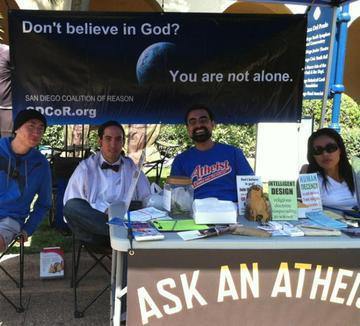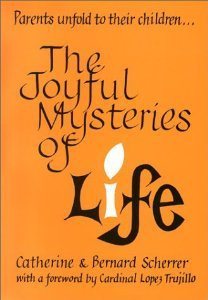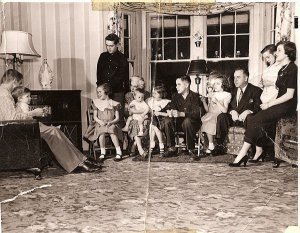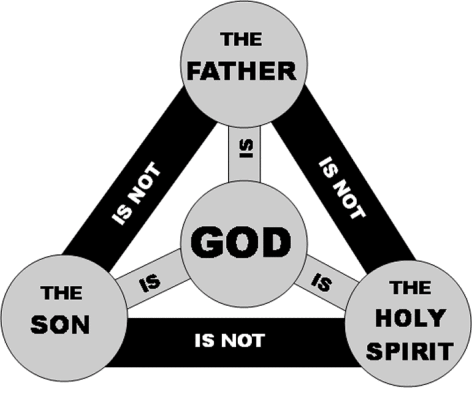Matt Fradd's Blog, page 65
November 26, 2013
Debating Atheists in the Park
Last Saturday Trent Horn and I headed to the park to debate atheists.
Ah, a Christian nerd’s dream.
The park we went to is a beautiful park called Balboa Park. On Saturday’s, different groups (Christians; Hare Krishna’s; Atheists; tarot card readers) set up tables, pass out literature, tell you you’re going to Hell, or—as was the case with our Atheist friends—tell you no Hell exists.
It was a lot of fun.
Debating Atheists with Trent Horn is like making friends with the new kid in school who is bigger than all the other bullies who’ve ever picked on you and then going to talk to those bullies. He’s smart. Annoyingly so.
The arguments that took place were very pleasant. The Atheists at the table were kind and smart which made for good discussion.
You can read Trent’s account of the morning here.
A Useful Approach
Trent asked a question which I think is a very good one; one I’ll use in future discussions. He asked, “In your opinion, what is the best argument for Atheism, and the best argument for theism?” What a great question. It cuts to the quick (not sure if you use that expression in America), it get’s to the heart of the matter: what good reasons are there to think that God exists, and what good reasons are there to think that Atheism is true. If the reasons for thinking God exist are more compelling then we shouldn’t be Atheists. Conversely, if the reasons for thinking Atheism is true are more compelling then perhaps we should give up belief in God.
I use something like this approach in my discussion with Protestants, “What is your strongest argument against Catholicism? What’s your number one contention with the Catholic Church.” Once they state it, and I answers it, it should show them that, since their strongest argument can be dealt with, their weaker one’s might be able to be dealt with to. [1]
If our Atheist friend had of answered the question—we’ll see in a minute that he didn’t—then we could examine those two arguments and then show, if possible, that the argument for Theism is stronger than his argument for Atheism, and since these were the two strongest arguments he could think of, he should consider abandoning Atheism.
Unfortunately our Atheist friend (1) did not think that Atheists had any beliefs and therefore thought no argument for Atheism was necessary (see why I disagree) and (2) thought that there was no good argument for Theism. “They all suck,” he said.
Road block.
If you’re looking to get better equipped at answering Atheism, then you should get Trent Horn’s book, (I promise he’s not paying me for this. He should, the punk) Answer Atheism.
If you’re looking to get into public evangelization like this, check out the folks at St. Paul Street Evangelization. They’re doing great work.
———-
[1] Alright, I’ll share one example. Several months ago, while pouring cream into a coffee I had just bought at the airport, a woman, apparently noticing how happy I was asked if I were a Christian. I told her I was. I shared with her that I was a Catholic apologist and her smile vanished. “oh sweet boy,” she said in her southern accent, “it would take you more than a lifetime to convince me why I should become a Catholic.”
“What’s would you say is your strongest argument against Catholicism?” I asked.
She thought for a moment. “That you have to go to Mary instead of Jesus.”
“I am so happy,” I said, “that I can be the one to eliminate your strongest argument against Catholicism. Catholics simply don’t believe that they have to go to Mary instead of Jesus. So that should no longer be a problem for you.”
She still wasn’t happy.
Filed under: Atheism








November 25, 2013
Why Mormonism is Not a Cult
Last week I wrote an article, 1 Very Useful Tactic When Dialoging With Mormons.
I have to say that I was surprised at the amount of interest it generated.
One of the comments read:
Ask a Mormon if there has ever been a verified miracle in their cult, there hasn’t. Ask one why Joey P. Smith who made all the nonsense, couldn’t convince his wife at the time of any of the nonsense. I have watched the BYU channel on television, and it is very sad to see decent looking, seemly educated white people talking nonsense about that cult.
The commenter went on to use the word cult four more times. His comment made my skin crawl a little. Is this the “gentleness and reverence” (1 Pet. 3:15) that St. Peter said we ought to use when defending our faith? I think not. Either way, it got me thinking. Is Mormonism a cult? And what does cult mean anyway?
In this post I’d like to make the case that Mormonism is not a cult.
Looking forward to your colorful comments below. 
Cult: Then and Now
The term ‘cult’ has a very different meaning today than it did originally. It was once used (and in some cases still is) as a term to describe a system of ritual practice. Hence, Pope Paul VI’s apostolic exhortation, Marialis Cultus, or, in English, Marian Devotion.
Another example can be found in a general audience of Pope John Paul II where he quoted the Second Vatican Council, urging that “the cult … of the Blessed Virgin, be generously fostered, and that the practices and exercises of devotion towards her, recommended by the teaching authority of the Church in the course of centuries, be highly esteemed”.
We may also rightly speak of the cult of the infant of prague, or the cult of the Sacred Heart. In referring to these devotions as cults we’re simply acknowledging them as systems of ritual practice.
Over the years, however, “the word cult has come to denote a relatively small, far-from-mainstream group that typically displays several characteristics such as centering around a highly charismatic leader, utilization of mind control techniques, the giving of large amounts of money/possessions to the group, inability to leave at will, and other similar issues that revolve around control.” [1]
Due to this confusion, the word cult, it seems to me, has become essentially useless; little more than a 4-letter slur people lodge at one another to dismiss them out of hand. After all, If you’re a part of a cult, I don’t have to take you seriously. I don’t have to take the time to listen to you.
The Dictionary
That said, perhaps you disagree with me. Perhaps you think that cult does have a hard and fast definition and that that definition describes Mormonism perfectly. Well, let’s look at that. I’ve researched several reputable online dictionaries and found that the term ‘cult’ had several common elements.
Let’s take a look at them and see if they describe Mormonism:
1. A relatively small group of people
Mormons have around 13 million members in over 100 countries throughout the world. Not what I’d call a relatively small group.
2. Religious beliefs or practices regarded by others as strange or sinister.
Now if you’re not a Mormon and know anything about their teachings, you’ll probably agree with me that they believe a lot of strange stuff! But does that really justify us in calling them a cult?
If it does then it also justifies non-Catholics in calling Catholicism a cult. The immaculate conception? The Scapular? The Eucharist? Now, some of you are going to accuse me of putting Catholic teaching on the same level as Mormon teaching; I’m not doing that. I think the Catholic is justified in believing these three things and the Mormon lacks justification for, say, thinking that God (the one we are supposedly bound to worship) lives on or near a planet called Kolob. But this doesn’t change the fact that Catholic teaching cannot and does not appear strange, or even sinister to those who aren’t Catholic. [2]
3. A great devotion to a person, idea, object, movement, or work.
Now, while one can argue, as I certainly do, that Joseph Smith was a false prophet and therefore undeserving of great devotion, that’s not how the Dictionary defines cult. It isn’t interested in the person’s credibility, just whether the group has great devotion to him.
If Mormonism can be labeled a cult based on this definition then so can Catholicism. Let’s look at each category. Person: St. Jude. Idea: God loves us and sent his son to die for us so that we can have the possibility of spending eternity with him in Heaven. Object: ah, this medal around my neck. Movement or work: the proclamation of the Gospel?
4. Controlled by threats of isolation
I often hear Christians telling horror stories of Mormons who left Mormonism only to have their family and friends shun them. Okay, perhaps this happens in some circumstances, but—and unless you can prove me wrong on this—it’s not an official teaching of the church of Jesus Christ of Latter-day Saints. If some Mormons are acting in this way then they’re not acting consistently with what their religion teaches.
Any justification a person might think he has from dictionary definitions for labeling Mormonism a cult, I think, can be turned around to make any religion seem cult-like. It’s all relative.
Evangelizing Mormons
Does all of this mean that we should not be evangelizing Mormons? Of course not. I just think that telling them that they’re a part of a cult is neither helpful nor accurate.
Instead of quibbling over terms that have no objective agreed upon definition we should discuss the substance of what they believe, help them see why they’re in error and share the truth with them with “gentleness and reverence” (1 Pet. 3:15).
If you’re looking for a substantive and charitable debate between a Christian and a Mormon, you should download Patrick Madrid’s debate with Elder Gary Coleman, The First Catholic — Mormon Dialogue
———-
[1] I found this insightful quote on a bluelight forum (http://www.bluelight.ru/vb/archive/index.php/t-608517.html?s=f8f7068e5e1a375b3bdc3104d840d59a)
[2] For example, The Church’s teaching that homosexual acts are intrinsically evil is considered sinister by a growing number of Americans, wouldn’t you say?
Filed under: Apologetics








November 22, 2013
1 Very Useful Tactic When Dialoging with Mormons
I’ve never met a Mormon I didn’t like. My next door neighbors are (temple) card-carrying, alcohol avoiding, special underwear wearing Mormons. We’re very close and I love them dearly. They’re kind, generous, and committed.
They’re also wrong.
Mormonism, though it contains elements of truth, is a severe perversion of the Gospel of Jesus Christ.
I don’t intend to rehash those perversions in this post, instead I’d like to help you prepare for a first encounter with a Mormon.
This is a technique I consistently use. It works every time, I think for two reasons. 1. They don’t expect it. It’s different to what they usually hear: What about polygamy! or Why did Mormons deny blacks the priesthood! and 2. It helps them understand why you’re not interested in hearing what they have to say, without being a jerk.
Obviously after your first encounter with a Mormon, if you agree to continue the discussion, you’ll owe it to him to study his religion (and your own) in order to share at greater depth why it is you disagree with him and why he should join the Catholic Church.
Thought Experiment
I begin by assuring the missionaries (who I never call elder. They’re not my elders, neither in age (usually) nor in the faith) that I’m not trying to be rude and that I in no way mean to come across as condescending or insulting.
I then ask if I could try out a thought experiment on them. They agree because they’re Mormons and therefore seemingly incapable of being impolite.
[For those of you who aren't familiar with Mormonism, the thought experiment is a parody of the Joseph Smith story].
Here’s what I say:
Suppose I said to you that there was a man by the name of John Smith, who in 1920, 100 years after Joseph Smith received his “revelation,” began wondering which of the many christian churches to join. After much prayer he received a revelation from God who told him that all the religious denominations (including Mormonism) were believing in incorrect doctrines and that he was to await further instructions from on high.
I then tell the missionaries that In a later revelation John Smith received, emblazoned on metal slabs, further inspired works from the Heavenly messenger Doroni that would, essentially, add to the Bible. This religion is called Dormonism and John Smith is the prophet which restored the purity of the Gospel.
I then proceed to take three thick books off of the shelf and say, here is the book of Dormon, and two other books (that stand for pearl of great price and doctrine and covenants).
I tell them that the book of Dormon (like the book of Mormon) contains a promise that whoever reads it sincerely, ponders its contents and asks God if it is true will receive that knowledge by the power of the Holy Ghost.
The conversation usually follows like this:
You: “Now, as I said, this was just a thought experiment, but suppose I was serious, tell me, would you take this book and read it prayerfully?”
Mormon: “no.”
You: “Why not?”
Mormon: “Well, this is obviously made up and the Mormonism isn’t.
You: Okay, yes it’s made up, but that’s the nature of a thought experiment; pretend I’m serious. Why wouldn’t you take these books home and read them?
Mormon: Because I think it’s false. Because, I know that Mormonism is true and therefore this has to be false.
You: Terrific! And now you understand the exact position I am in. You see, I’m not interested in reading the book of Mormon because I have already accepted the truth of the Catholic faith, therefore I know that Mormonism, since it conflicts with Catholicism, cannot be true. So unless you can give me a really good reason to abandon my faith, I’m not interested in hearing you out. You see, Jesus Christ established a Church. He said of that Church that the gates of Hell would not prevail against it (Mt 16:18). He said to the leaders of that Church, “he who hears you hears me” (Lk 10:16). Since I believe that Jesus Christ is sinless I know that he was not lying and I know that the gates of Hell have not prevailed against the Church he founded—the Catholic Church.
Now (I’m talking to you now), I’m not pretending that the Mormon won’t have a rejoinder to this. He’ll likely go into what they call the great apostasy, which, he’ll say, can be demonstrated from Scripture (it can’t).
A Caveat
I want to reiterate my high esteem for those within the church of Jesus Christ of Latter-day saints (their official title). Their efforts to evangelize; their strong family values, and the support they offer one another as a community is commendable. We as Catholics can and should learn a lot from them.
If you have Mormon friends or family, love them. Don’t take cheap shots. Don’t misrepresent their views. Study what it is they believe and then be gentle in sharing the fullness of what they may have caught a glimmer of in their own faith; Jesus Christ.
For other tactics and techniques, see Mormon Stumpers
Filed under: Apologetics








November 21, 2013
3 Resources to Help Teach Chastity to Your Kids
A few years back while speaking in Canada I was asked a question: “What good chastity resources are there out there for kids? Not teens; kids.” I couldn’t think of one.
Not because there weren’t any, but because I hadn’t really thought about it.
Well now that I my toddlers are growing into children I am massively concerned about it.
Here then are 3 resources for you and your children that will help to teach them about the virtue of chastity.
1. The Joyful Mysteries of Life
The Joyful Mysteries of Life was written by Catholic parents for their own children, this book introduces the “facts of life” to pre-teens in a reverent and respectful manner by presenting the biological facts in the context of meditations on the joyful mysteries of the Rosary. Chastity is shown to be the Christian way of living out God’s will as it encourages an attitude of reverence for the mysteries of procreation.
2. The Squire and the Scroll / The Princess and the Kiss
These are a great couple of books with outstanding artwork. The Squire and the Scroll is for boys, and The Princess and the Kiss for girls. Both books appeal to the natural desires boys and girls have for adventure, battle, romance. I’ve read them both to my children and they enjoyed them! They were learning about chastity without realizing that they were learning about chastity.
3. Prayer
Finally, I’d like to share with you a prayer which I learnt from Christopher West that I pray over my children each night.
“Heavenly Father, I thank you for making [name] a good boy/girl, I pray that he/she would grow up to be a strong man/beautiful woman, to give his/her life away as a priest/nun or a husband/wife. Hail Mary . . . “
I love this prayer for three reasons:
1. It reinforces within them the goodness of their own sex and hence the goodness of their bodies: It is good to be a boy! It is good to be a girl!
2. It’s a constant reminder that their life is not just about them, it’s meant for something much larger, it is meant to be given away!
3. It introduces from a young age that religious life is a good and viable option.
Or course, in order to teach your children the virtue of chastity, you must first know what it is! To learn more about chastity and the Church’s liberating view on human sexuality, spend more time at www.chastityproject.org
Join the Conversation!
What resources have your heard of or have found helpful when teaching chastity to children?
Filed under: Sexuality








November 15, 2013
My Interview with Audrey Assad on Female Porn Addiction
Audrey contributed her story to my new book, Delivered, of having once been hooked on porn as a young woman and then, later, by God’s grace, finding hope and healing.
We recently shot some emails back and forth on the topic of female porn addiction.
Oh, and for those of you who have not yet heard of Audrey Assad . . . Buckle up!
Right? Check out her site!
Here’s our interview. We’d love to hear your feedback!
Matt: Audrey, on a scale from 1 to stepping on lego barefoot, how much does it hurt you when you hear someone say, “girls don’t struggle with porn. Porn is a guy’s issue.”
Audrey: It’s certainly a little stab to my heart when I overhear something like that, especially when it’s spoken from a platform. Whenever I heard this as a teenager it isolated me even more in my battle against pornography addiction, because it reinforced my assumption that I should never tell anyone about it.
I thought that I was the only woman in the world going through it—and this was Satan’s greatest foothold in my heart and mind while I was in bondage to pornography.
As long as I thought I couldn’t tell anyone, it was virtually impossible for me to experience deliverance.
Hearing things like this from the platform of ministry only reinforced the deception.
Matt: I know you’ve had the opportunity to share your story of porn addiction and recovery with young women all over the country. What’s their reaction?
Audrey: It’s pretty incredible how many girls will share the truth about their addictions with you if you just speak up about yours.
A few years back I spoke at a conference for high-school students and shared (briefly) my testimony at a girls’ session; and then for the rest of the week girl after girl pulled me aside to share that she was battling pornography addiction.
I probably talked to fifty girls. And their youth leaders were pulling me aside as well–some to share their own struggles and some telling me about their uncertainty about what to do with the students who had suddenly been confessing to them. One told me that a girl in her group shared that she’d been compulsively viewing pornography since the age of eight.
It’s a lot more common than anyone would like to believe, and the sooner we learn how to address it, the sooner more and more young women can find freedom in community.
Matt: What three things would you recommend to a woman struggling with porn who may be reading this?
Audrey: I’d recommend confession first: whether you’re Catholic or Protestant, speaking your sins aloud to someone you trust is the surest way to begin to confront them, and then to walk away from them.
Secondly, accountability: pick several people in your life (probably of your same gender, unless you’re choosing your brother or your dad) who know you well and who don’t judge you for your sins, but who care enough about you to hold you accountable to what you are attempting to do.
Thirdly, counseling: pornography feeds on what is, deep-down, a good and innocent need—the need for intimacy, for love, and for affection. Most often when someone is addicted to pornography, the foothold of the enemy is to warp and twist those natural, God-given needs and desires. A good counselor can help you unravel the spiritual and emotional reasons those needs and desires are being preyed on, and help you develop healthy ways to meet those needs at your stage in life and in your state in life.
Matt: Thanks for your time, and thanks again for contributing to the new book!
Filed under: Pornography








November 13, 2013
Miraculous Medals and Porn Shops
One thing I’ll often do when I come across a porn shop is burry a miraculous medal next to it. Then, whenever I pass it I pray, “Blessed Mother, I pray that this establishment would lose business and close down.
Just an idea.
Hit this one up today (and by hit this one up, I do NOT mean that I entered the building . . . just to clarify).
If you want to join me, here’s a great apostolate that sells them in bulk, dirt cheap!

Filed under: Pornography








Breaking Free From Porn: A 5 Step Battle Plan (Part 2)
In my last article we looked at two important approaches to heal from pornography: prayer and accountability.
In this article we will look at three more.
If you haven’t yet read the first two steps, be sure to!
As I said in my previous article, these five steps constitute a battleplan which, in my experience, is essential (notice I didn’t say simply helpful) for anyone wishing to be free of pornography.
3. Counseling
Sometimes the struggle for purity needs professional help, and there are plenty of good Christian counselors out there who are willing and waiting to give it. Sometimes people—men especially—can think that admitting they need counseling is something to be ashamed about. It is not. What would be shameful is realizing at the end of your life how much you and your loved ones suffered because you were too proud to seek healing.
How do you know if you may need counseling? Here are five questions to ask yourself. Answering yes to any of them could mean that you would benefit from professional counseling:
1. Do you have a preoccupation with pornography?
2. Have you had repeated unsuccessful attempts to control or stop viewing pornography?
3. Do you use pornography as a reward for hard work, and/or a way to escape problems or negative emotions?
4. Are you risking the loss of a significant relationship, job, or educational or career opportunity because of the use of pornography?
5. Have you been thinking that you might need counseling because of your pornography use?
For more information, visit Integrity Restored, run by clinical psychotherapist Peter Kleponis. Dr. Kleponis is a Catholic who specializes in helping those struggling to be free of pornography.
4. Educate Yourself
In the battle against pornography, it’s important that we not only feed our souls, but our minds. Educating yourself on the destructive nature of pornography will help convince you to break free from it. Here’s what the Catechism has to say about it:
“Pornography consists in removing real or simulated sexual acts from the intimacy of the partners, in order to display them deliberately to third parties. It offends against chastity because it perverts the conjugal act, the intimate giving of spouses to each other. It does grave injury to the dignity of its participants (actors, vendors, the public), since each one becomes an object of base pleasure and illicit profit for others. It immerses all who are involved in the illusion of a fantasy world. It is a grave offense. Civil authorities should prevent the production and distribution of pornographic materials.”
Here are some resources that will help you unpack why pornography is so harmful and destructive:
Books
Delivered: True Stories of Men and Women who turned from Porn to Purity by Matt Fradd.
Recovery from porn is possible, and this book proves it. Delivered contains ten stories of men and women who found freedom after having been ensnared by pornography.
Wired For Intimacy: How Pornography Hijacks the Male Brain by William M. Struthers.
Dr. Struthers, a neuroscientist and researcher, explains in fascinating detail the devastating neurological effects of porn use and how they can be reversed.
The Pornography Epidemic: A Catholic Approach by Peter C. Kleponis.
Here Dr. Kleponis offers a Catholic approach to fighting porn both in our personal lives and in our culture.
Websites
The Porn Effect is dedicated to exposing the harmful effects of pornography.
Beggars Daughter provides helpful tools, advice and support to women struggling with sexual sin such as pornography and masturbation.
Chastity Project is the most comprehensive site on the web resource for promoting the virtue of chastity.
Articles
Slave Master: How Pornography Drugs & Changes Your Brain by Donal L. Hilton Jr.
Neurosurgeon Donald L. Hilton explains the addictive effects pornography has on the human brain.
Parenting the Porn Generation by Matt Fradd
In this article I explain the grim reality that confronts our children today and offer practical tips about how to parent them wisely on the Internet.
Five Myths About Porn by former porn performer April Garris
Former porn actress April Garris exposes five myths that are commonly believed about the porn industry.
Audio Products
Taking Down Goliath by Matt Fradd
In this audio presentation I share my own story of recovery and suggest five strategies (more detailed than the ones presented here) to get porn out of your life.
The Ugly Truth: Two Former Insiders Expose the Reality Behind the Porn Industry In this audio presentation I conduct two interviews: the first with a former porn actress and the second is with a former Playboy producer. The Ugly Truth is a difficult but edifying listen, and a sobering answer to porn’s lies.
Porn Detox: by Jason Evert
This CD (also available on iTunes and Amazon MP3) provides great tips to help men conquer their daily temptations with lust, with special emphasis on breaking free from pornography.
5. Patient Perseverance
Finally, be patient with yourself. Remember that the wounds you have received didn’t come about overnight, and the healing won’t take place overnight also. It takes time, perseverance, and determination.
“Have patience with all things,” urges St. Francis de Sales, “but chiefly have patience with yourself. Do not lose courage in considering your own imperfections but instantly set about remedying them—every day begin the task anew.”
Several years ago, as I stood in line for the sacrament of confession, about to confess for the umpteenth time a sin I couldn’t seem to quit, I began to fear that God’s mercy was running out. I didn’t doubt that God would pardon a person who turned to him after a life of the most heinous sins imaginable. What I did doubt was that he would continue to forgive me. How many times have I said, “I will never do this again,” only to return to that sin like a dog to its vomit (2 Pet. 2:22).
At that moment, by God’s grace no doubt, I was reminded of the incident in the gospel of Matthew when Peter approached our Lord with a question:
“Then Peter came up and said to him, “Lord, how often shall my brother sin against me, and I forgive him? As many as seven times?” Jesus said to him, “I do not say to you seven times, but seventy times seven” (Matt. 18:21-22).
Now what our Lord did not mean was that Peter was to forgive his brother 490 times and then no more. No, rather, “seventy times seven” signified perfection and consistency. It then occurred to me, if God’s forgiveness is not like that—perfect and consistent—then Jesus was commanding Peter to act in a way that was contrary to the nature of God.
The truth is, God is infinite in all of his attributes. In fearing that God’s mercy was slowly evaporating, I was unintentionally making God in my image. If you have ever been tempted to doubt God’s mercy as I did, or if you’re tempted to do that now, please ingrain the following words from St. Claude de la Colombiere into your brain:
“I glorify You in making known how good you are towards sinners, and that your mercy prevails over all malice, that nothing can destroy it, that no matter how many times or how shamefully we fall, or how criminally, a sinner need not be driven to despair of Your pardon… It is in vain that your enemy and mine sets new traps for me every day. He will make me lose everything else before the hope that I have in your mercy.”
Regardless of where you have been or what you have done, be at peace. The same God who forgave Moses the murderer, Rahab the prostitute, David the adulterer, and Peter the denier will forgive you also. All you have to do is seek that forgiveness with a contrite heart. The only sin God won’t forgive is the one you will not ask forgiveness for.
Learn the first two steps!
Filed under: Pornography








Breaking Free From Porn: A 5 Step Battleplan!
If you or someone you love struggles with pornography, it’s my hope that the following two articles will be of help to you as you seek to be free, and seek to be healed.
In this article I will suggest two approaches, and in my next one I will suggest three, that are proven to help those who want to be free from pornography.
These five approaches constitute a battleplan which, in my experience, is essential (notice I didn’t say simply helpful) for anyone wishing to be free of pornography.
I often have people writing me, saying that they simply can’t break free of this stuff. While I can sympathize with their pain—I’ve been there myself—I always point them to this battleplan. If they respond with excuses as to why they can’t do one of the approaches, I tell them that I don’t have time to help people who aren’t serious about recovery.
So, are you serious about recovery? Are you willing to do whatever it takes? If so, read on. If not, click here.
Before We Begin
Before we look at these five steps, however, I think it’s important to dispel a myth about purity that many people believe: that it’s a destination. In reality, purity is not so much a destination as it is a daily choice. If you are thinking of purity as a state you’ll arrive at after such and such a time, or once you get your prayer life in order, you will almost certainly remain frustrated and discouraged.
Why? Because even after we have come to the Lord we are still left with a fallen human nature and “must still combat the movements of concupiscence that never cease leading us into evil” (CCC 978). Sexual purity involves self-mastery, which is a “long and exacting work [that] one can never consider. . .acquired once and for all. It presupposes renewed effort at all stages of life” (CCC 2342).
That said, the following steps are crucial and, in my humble opinion, indispensable to anyone who is serious about overcoming his porn problem.
1. Prayer
The importance of prayer may seem so obvious, perhaps even trite, that you might think it isn’t worth mentioning. But guess what? When we stop mentioning it, we stop doing it. Many people—perhaps even you—often complain that they just don’t have the time to pray, or can just manage to rattle off an Our Father before bedtime.
Lack of time is a lame excuse, though, for we always find time for that which we love.
Despite our busy schedules we usually find time for TV, Facebook, waiting in line for coffee… and sin. So from now on, don’t say, “I don’t have time to pray.” Be honest and say, “I don’t have the love to pray.”
And then tell our Lord that. Tell him “I don’t have love,” in a similar way to how our Lady told Jesus at the wedding of Cana “they have no wine” (Jn. 2:3). She didn’t make demands of Jesus, she simply stated a fact, trusting that he would act. We should do likewise.
Allow me to suggest three methods of prayer which have been of great help to myself, followed by a short prayer for purity that was written by St. Thomas Aquinas:
The Rosary
“To recite the Rosary,” wrote Pope John Paul II, “is nothing other than to contemplate with Mary the face of Christ.” To commit to praying the rosary, perhaps even daily, is to commit to spending fifteen to twenty minutes in quiet contemplation. Often those who use pornography habitually say they experience an inner disquiet that can make contemplation seem almost impossible. The rosary is a practical and beautiful way to reverse that problem, to begin quieting our minds and our passions.
Some people dismiss the rosary as too simple, a prayer for blue-haired church ladies. Though it’s true that the Rosary is a humble prayer, this is by no means a defect. Consider the humble offering of the young boy who volunteered five barley loaves to our Lord (John. 6:9). That two was a simple offering, but its result was magnificent! In the same way, when we offer the five decades of the rosary through the hands of our Blessed Mother to Jesus, what can he not do?
The famous words of one bishop, Hugh Doyle, are appropriate here: “No one can live continually in sin and continue to say the Rosary: either they will give up sin or they will give up the rosary.”
Scripture
The Word of God is, as Hebrews 4:12 tells us, “living and active, sharper than any two-edged sword.” Memorizing Scripture verses that pertain to purity can be of great help in moments of temptation. Here are over twenty Scripture verses for you to look up:
Purity
Temptation
Sexual Sin
Mercy
Spritual
Warfare
Matt 5:8
Jas 1:14-15
Sir 23:18
Mk 2:17
1 Pet 5:8-9
1 Tim 4:12
1 Cor 10:13
1 Thes 4:3-8
Ps 51:1-2
Eph 6:10-17
Phil 4:8
2 Tim 2:22
Mk 9:47
Heb 8:12
John 10:10
Ps 24:3-4
Ps 101:3-4
Ps 51:1-2
Ps 103:12
Rom 12:2
Sir 7:36
Ps 119:9
Fasting
In the battle of the flesh, fasting can also be a powerful way to pray. You could say that prayer without fasting is like boxing with one hand tied behind your back, and that fasting without prayer is, well, dieting. To achieve purity both are needed. “If you are able to fast,” writes St. Francis de Sales, “you will do well to observe some days beyond what are ordered by the Church, for besides the ordinary effect of fasting in raising the mind, subduing the flesh, confirming goodness, and obtaining a heavenly reward, it is also a great matter to be able to control greediness, and to keep the sensual appetites and the whole body subject to the law of the Spirit.”
The vice that often leads to sexual sin is a lack of self-mastery. Fasting from legitimate pleasures, even small ones, builds up that virtue within us. When I get a plate of hot fries I may choose to deny myself salt. When I pour myself a cup of coffee I may choose to deny myself cream or sugar. The regular habit of denying us good things gives us the inner strength to avoid bad ones. Put it this way: If we can’t say no to a cookie or another slice of pizza, how will we ever say no to the temptation to look at pornography?
2. Become Accountable
Accountability means allowing another person to remind you of who you are and who you desire to be. It means being transparent with a trusted friend or mentor about your struggles so that he can offer encouragement and support. It’s an ongoing reminder that no sin is private; that even our hidden choices can have disastrous consequences.
I have never met anyone who was able to break free from porn without accountability. No recovering porn user can be an island! We need each other. If you’re a Catholic then one obvious and necessary way to be accountable is to find a good confessor and stick to him. Don’t “priest hop” because you’re ashamed of confessing the sin again so soon. The priest is not there to judge you but to love you. Confessing to the same priest will be an opportunity to humble yourself while honestly facing the severity of your problem.
One very practical—and in my opinion essential—tool for online accountability is accountability software called Covenant Eyes. Instead of just blocking certain websites (although it has that function also), it monitors all the sites that you visit and then sends a report to your accountability partner (it even monitors the websites behind the advertisements on the site you’re visiting). Online accountability changes your web-surfing mentality: Rather than wondering how you could get around a filter to visit some forbidden-fruit website, you will know that you could visit the website, but that you will be held accountable for it.
When you think about it, isn’t this how the heavenly Father acts towards us? He could “block” us from turning our backs on him and from the pain our sins bring, but he does not. Rather he teaches us right from wrong, and implores us to do what’s right (while giving us the grace necessary to do it). He does not censor our every thought and action because he desires us to grow up to be responsible moral agents: sons and daughters who freely choose what is good.
Covenant Eyes seems to have thought of all the loopholes porn users will think of ahead of time. For example, if you delete your account, view porn and then reinstall your account, your accountability partner will be notified. If the temptation to view porn at any moment threatens to overwhelm you, there is also a “panic button” you can click. Your Internet will be completely disabled; the only way to get it back is to contact the folks at Covenant Eyes.
For a free 30 day trial, use the promo code “pureinheart.”
In my next article we will look at three more approaches to freedom from pornography.
Prayer for Purity by St. Thomas Aquinas
Dear Jesus, I know that every perfect gift, and especially that of chastity, depends on the power of your providence. Without you a mere creature can do nothing. Therefore, I beg you to defend by your grace the chastity and purity of my body and soul. And if I have ever sensed or imagined anything that could stain my chastity and purity, blot it out, Supreme Lord of my powers, that I may advance with a pure heart in your love and service, offering myself on the most pure altar of your divinity
all the days of my life. Amen.
Now go and learn about the final three steps!
Filed under: Pornography








November 12, 2013
The 3 “Musts” When Evangelizing!
When evangelizing we ought to keep three things in mind. Those three things are summed up nicely in a single verse of the first letter of Peter:
“but in your hearts reverence Christ as Lord. Always be prepared to make a defense to any one who calls you to account for the hope that is in you, yet do it with gentleness and reverence” (1 Peter 3:15).
1. Sanctity
“In your hearts reverence Christ as Lord.”
Evangelization without a sincere desire and effort on the part of the evangelizer to grow in holiness will inevitably be ineffective.
One may be funny, entertaining, compelling, and even moving, but without the grace of God it will all come to naught.
Pope Paul VI in his decree on the apostolate of the laity wrote “Since Christ, sent by the Father, is the source and origin of the whole apostolate of the Church, the success of the lay apostolate depends upon the laity’s living union with Christ, in keeping with the Lord’s words, ‘He who abides in me, and I in him, bears much fruit, for without me you can do nothing’” (John 15:5).
2. Reasonableness
“Always be prepared to make a defense to any one who calls you to account for the hope that is in you.”
The word used for defense in the original Greek is apologia, which is where we get the word apologetics. I can’t tell you how many people initially think that my job is to travel the country apologizing for the Catholic Church (it’s always fun to disappoint them).
Are you prepared to make a defense for the hope you have? To Atheists? To non-Christians? To Protestants?
The Catholic Church is a champion on reason. Did you know that the first Vatican council define infallibly that one can come to know with certainty that God exists wholly apart from Divine Revelation?
If you’re not yet an apologist. Here are three free resources you should look into:
www.strangenotions.com – a site containing great articles on the existence of God and the historicity of Jesus Christ.
www.catholic.com – the first site you should visit if you have any questions about Catholic teaching.
Catholic Answers Live - Catholic Answers Live is a daily, two-hour radio program dedicated to Catholic apologetics and evangelization. It’s amazing. Start downloading their podcasts. Listen to them while you’re driving to work, working out, making sandwiches (I don’t know), and start educating yourself!
3. Gentleness
“yet do it with gentleness and reverence.”
In other words, don’t be a jackass (dynamic equivalence version?). People don’t generally hold to beliefs which they know are in direct defiance of truth. They have their reasons for believing it, reasons with which, though you can’t agree, you can sympathize.
For 5 tips on how to be gentle and reverent, see my article, How to Argue Without Being a . . . Male Donkey
Question: What are some ways that others have tried to evangelize you that have been less that helpful?
Filed under: Apologetics








November 11, 2013
3 Ways NOT to Share the Trinity
The mystery of the Most Holy Trinity is the “central mystery of [our] faith” (CCC 234). It is therefore the most fundamental. If we get it wrong, then everything else get’s obscured or perverted.
Since the mystery of the Trinity is “the mystery of God in himself” (CCC 234), humility is required here.
A mystery, it has been said, is not something that is unknowable, but infinitely knowable. That may not be true of some things we call mysteries, but it is of God.
But just because we cannot fully understand something doesn’t mean that we cannot understand errors about that thing.
For example, Jesus Christ is the most mysterious person who ever lived, but correcting someone who says that Jesus was a woman, or that Jesus wasn’t a Jew, does not reveal a lack of humility.
Since the Trinity is the most fundamental and essential teaching in the “hierarchy of the truths of faith,” we ought to stamp out errors wherever we find them.
With that said. Here are three ways not to share the Trinity, and three way to share it.
1.The Trinity is like how a man can be a Son, Father, and Uncle
Nope! This analogy commits the heresy of modalism. Modalism is the false belief that God is one person who has revealed himself in three forms or modes.
Though a man may be a son, father and uncle, he is not three persons as God is, but one person who has three titles. Another popular but false analogy is the following: the Trinity is like how water can be ice, liquid and steam. This again commits the heresy of modalism. God does not go through three different states. The Persons of the Holy Trinity can co-exist; the different forms water may take cannot. Water cannot be ice, liquid and steam at the same time. It may be between two stages such as when ice is melting, but this isn’t coexisting, it’s transforming.
2. The Trinity is like a three leaf clover
This commits (or could at least lead one to believe) the heresy of Tritheism. Tritheism divides or distinguishes the nature of God, and in so doing “creates” three gods.
A three leaf clover has three separate leafs. The middle leaf, for example, does not share in the same nature as the other two leafs, but only has a similar nature. In the Trinity, each member shares in the exact same nature. The key here is understanding that we don’t believe in three persons who share in a species called “God,” but three persons who share in an identical, united nature. ”The Father is that which the Son is, the Son that which the Father is, the Father and the Son that which the Holy Spirit is, i.e. by nature one God.”[1]
3. The Trinity is like an egg: yellow yoke, white yoke, and shell
This commits the same error as number 2. While the egg is one, it has three substances (yellow yoke, white yoke, and shell) which make it what it is. Each of these things are distinct. The shell is completely different in nature from the yellow yoke.
3 ways to explain the Holy Trinity
Though it’s tempting to use an analogy to help our children better understand who God is, ultimately, they all fail. I don’t mean that they fail to fully communicate the Trinity (all analogies fail to fully communicate what they’re trying to convey), I mean that they fail to capture the correct definition of the Trinity, and it’s better that our children not fully understand who God is than to have a false understanding of him.
For this reason I don’t use analogies for the Trinity. The closest I get to “dumbing it down” for my kids is by 1). A simple conversation about being and person. 2.) A simple diagram, and 3). The Athanasian Creed.
1. The conversation
Me: Liam, what is a person?
Liam: I dunno.
Me: A person is someone who can potentially say “I.” Is a statue a person?
Liam: No.
Me: So there are some beings, like statues, which are not persons, right?
Liam: Right.
Me: What about you, are you a person?
Liam: yes.
Me: Okay. So a statue is a being with 0 persons. You are a being who is 1 person. God is a being who is three persons. Make sense?
Liam: Not really.
Me: Good.
2. Diagram
3. Athanasian Creed
Here it is in part, and it’s BEAUTIFUL!:
We worship one God in Trinity and Trinity in Unity. Neither confounding the Persons, nor dividing the Substance.
For there is one Person of the Father, another of the Son, and another of the Holy Ghost.
But the Godhead of the Father, of the Son and of the Holy Ghost is all One, the Glory Equal, the Majesty Co-Eternal. Such as the Father is, such is the Son, and such is the Holy Ghost.
The Father Uncreate, theSon Uncreate, and the Holy Ghost Uncreate.
The Father Incomprehensible, the Son Incomprehensible, and the Holy Ghost Incomprehensible.
The Father Eternal, the Son Eternal, and the Holy Ghost Eternal and yet they are not Three Eternals but One Eternal.
As also there are not Three Uncreated, nor Three Incomprehensibles, but One Uncreated, and One Uncomprehensible. So likewise the Father is Almighty, the Son Almighty, and the Holy Ghost Almighty. And yet they are not Three Almighties but One Almighty.
So the Father is God, the Son is God, and the Holy Ghost is God. And yet they are not Three Gods, but One God.
So likewise the Father is Lord, the Son Lord, and the Holy Ghost Lord. And yet not Three Lords but One Lord.
For, like as we are compelled by the Christian verity to acknowledge every Person by Himself to be God and Lord, so are we forbidden by the Catholic Religion to say, there be Three Gods or Three Lords.
The Father is made of none, neither created, nor begotten. The Son is of the Father alone; not made, norcreated, but begotten. The Holy Ghost is of the Father, and of the Son neither made, nor created, nor begotten, but proceeding.
So there is One Father, not Three Fathers; one Son, not Three Sons; One Holy Ghost, not Three HolyGhosts.
And in this Trinity none is afore or after Other, None is greater or less than Another, but the whole Three Persons are Co-eternal together, and Co-equal. So that in all things, as is aforesaid, the Unity inTrinity, and the Trinity in Unity, is to be worshipped.
He therefore that will be saved, must thus think of theTrinity.
[1] Council of Toledo XI (675): DS 530:26.
Filed under: Apologetics








Matt Fradd's Blog
- Matt Fradd's profile
- 168 followers

















